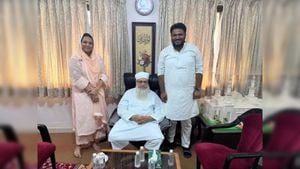Palakkad: The recent by-election for the Palakkad Assembly seat has become one of the most fiercely contested political events in Kerala's history. With polling taking place on November 20, 2024, the campaign ramped up to its final stage, brimming with high-stakes maneuvering and strategic realignments among the major political parties - the Left Democratic Front (LDF), the United Democratic Front (UDF), and the National Democratic Alliance (NDA).
The by-election was called after incumbent Congress legislator Shafi Parambil won the Vadakara Lok Sabha seat earlier this year, creating this vacancy. Since Parambil's victory over one of the most prominent figures from the CPI(M), former Health Minister K.K. Shailaja, the political environment has been charged with anticipation and ambition, as all three fronts claimed they would secure victory.
Each coalition’s campaign effort has been intense, replete with its own set of controversies and power struggles. The LDF has backed Dr. P. Sarin, previously with Congress, breaking away after he was overlooked for the nomination and declaring himself as the candidate for the Left. The UDF, meanwhile, marked out its territory with Rahul Mamkootathil, the president of the Youth Congress, even as he faced skepticism due to being from outside the constituency.
Adding to the campaign drama, the BJP's candidature went to C. Krishnakumar, who is expected to attract support due to his local roots and political experience, having served multiple terms as councilor. These changes are reflective of the strategic repositioning occurring within the parties as the stakes heighten.
The campaign's intensity was underscored by notable defections, particularly from BJP's ranks. Sandeep Warrier, known for his vocal stances on various issues, controversially switched to the Congress, stating he left the “factory of hate” to join “a shop of love,” alluding to comments made by Congress leaders. This move has been interpreted by analysts as both parties flexing their muscles and potentially reshaping the electoral dynamics.
Political rallies and public addresses became the norm as local party leaders rallied their supporters. Chief Minister Pinarayi Vijayan, headlining for Dr. Sarin, emphasized his government’s achievements since his administration took office, contrasting his record with the UDF’s tenure. “You can see the roads being built and the projects initiated,” he told the crowds, urging them to rally behind Sarin, whom he described as the ideal candidate.
Over at the UDF’s rally, Rahul Mamkootathil echoed sentiments focusing on the failures of the current administration, hoping to resonate with voters who felt neglected or unsupported by the government. He aimed to leverage Shafi Parampil’s previous success and popularity, particularly among rural voters, who had drawn considerable support from direct engagement during his tenure.
The Palakkad constituency is noteworthy for its balanced mix of urban voters within the municipality and rural constituents from surrounding villages. This demographic balance is pivotal for each candidate as they try to appeal across varying interests. The BJP, having seen notable increases in its voter base over the last decade, contends this appeal alongside rising community significance.
Voting patterns and community sentiments were complicated by the presence of significant Muslim and SC/ST populations, who are believed to hold considerable sway over election outcomes, particularly with their historical loyalties and setbacks experienced by the UDF and LDF.
Local political analysts who have observed the election have struggled to make predictions, citing the unpredictable nature of the current political climate driven by defections, internal conflicts, and the challenges to unity within each coalition. Analysts noted, “The election is not fought on any significant issues, but on personal allegations and issues rooted deeply within community dynamics and media narratives.”
Polling was set to begin at 7 AM and conclude at 6 PM, covering 184 polling booths expected to cater to nearly 194,706 eligible voters.
Throughout the campaign, there was also campaigning focused on ensuring fair and transparent elections, with allegations of black money and inappropriate electoral practices rising to the surface. Party leaders took these accusations seriously, pledging to maintain integrity throughout the process.
The atmosphere leading up to the election has been described as festive, with balloons, flags, and many supporters flooding the streets, each determined to make their voices heard clearly through the coming election.
The result, scheduled to be declared on November 23, 2024, is anticipated to not only have immediate local significance but also broader ramifications for the political trajectories of the main parties involved, influencing their approaches to the upcoming assembly elections set for 2026.
Each political party's confidence reflects their belief – whether justified or not – about their chances of capturing Palakkad's seat. Regardless of the outcome, this by-election will likely carve new avenues within Kerala's complex political fabric and influence the strategies of parties leading to the next assembly elections.



